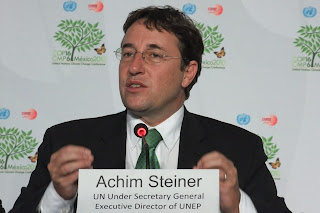By Makereta Komai, Climate Pasifika Media in Cancun, Mexico
 |
| President Anote Tong, Kiribati (midle) - chairing a UN side event in Cancun |
08 DECEMBER 2010 CANCUN --- The slow pace of negotiations and the inaction of the international community towards the needs of small and vulnerable states at the frontline of climate change was highlighted by President Anote Tong in his statement to the High Level Segment of the climate change negotiations here in Cancun.
A year has passed since the generous pledges were made in Copenhagen and nothing has come to the frontline states, who are witnessing first-hand the devastation caused by climate change, said President Tong.
“There is also an unbalanced treatment of adaptation and mitigation in spite of our increasingly desperate situation.
“I, as other representatives of most vulnerable countries are disappointed and deeply concerned that as an international community we continue to focus on negotiating a detailed and comprehensive arrangement which would appease the views of the different groups involved in the process.
For the most vulnerable states, time is running out. We demand that attention be centred on the needs of those most vulnerable, said President Tong.
Last month, Kiribati hosted a climate change conference for Vulnerable States, coming out with a set of decisions known as the Ambo Declaration.
The Declaration highlights the need for special package that is translated into action in the immediate term to ensure the survival of the most vulnerable and the frontline states.
“We cannot continue with business as usual, we must listen and take heed of what is happening in these most vulnerable states in the frontline and act accordingly and with urgency. It must be taken as an early warning to the international community and a precursor for what could ultimately be the fate of humanity if further action is delayed, said President Tong.
And the world, he said was looking to Cancun for leadership.
“I would like to return to the people, in particular the young people in my country with some assurance that as leaders we have agreed here in Cancun on measures to guarantee their future. A commitment to mobilize adaptation funds such as those pledged at Copenhagen which are accessible for the special needs of small and most vulnerable island states.
President Tonga said scientific projections not only confirm that climate change is happening now but earlier scenarios of the severe adverse impacts, in particular sea level rise may have been too conservative.
“Our experience and those of other low-lying island countries in the Western Pacific certainly indicates that something is seriously wrong when rows of trees and coastlines are progressively being washed away with time.
Since his last statement at the Copenhagen climate change summit in Copenhagen in 2009, President Tong said, “Our communities have suffered considerably more damage”.
He said there are more severe erosion, loss of homes and infrastructure, contamination of water supplies and destruction of food crops, which ultimately leads to the demise of his home island.
Kiribati is an island nation located in the Central Pacific, comprising 32 atolls. It has a population of almost 100,000.

















